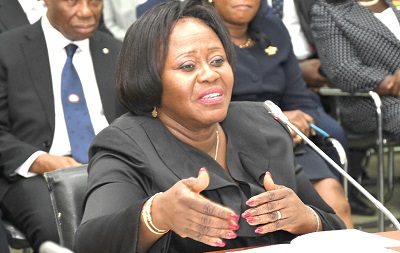Vetting of Chief Justice nominee: Matters arising
On April 25, 2023, President Akufo Addo nominated Justice Gertrude Torkornoo as the next Chief Justice of the Supreme Court.
Her nomination fills the vacancy being left by retiring Chief Justice Kwasi Anin-Yeboah. On May 26, the nominee appeared before parliament’s vetting committee as part of the confirmation process. The nominee spent a few hours answering several questions with astute sharpness, demonstrating the depth and knowledge she brings to the court. Two issues caught my attention, though, as the vetting progressed.
Birth certificate question
The Chief Justice nominee was asked whether one’s birth certificate is proof of nationality or citizenship, to which she responded “No”. Her response is consistent with the court’s position on the matter. I painstakingly reread the court’s decision in the consolidated writs of National Democratic Congress vs. Attorney General and Electoral Commission and Mark Takyi-Banson vs Electoral Commission and Attorney General.
In that decision, the court said “A birth certificate is not a form of identification. It does not establish the identity of the bearer. Nor does it link the holder with the information on the certificate. Quite obviously, it provides no evidence of citizenship.” The court cited cases that provided the constitutional justification for its position.
In her explanation, the Chief Justice nominee used two phrases that have remained in my mind. First, that the birth certificate is a record of one’s birth and second, the doctrine of originating process. The first was easily understood, while the second needed the assistance of friends in the legal field. In the context of acquiring a passport, which the nominee agreed to, serves as proof of nationality/citizenship, the doctrine of originating process, if I understood them correctly, simply means the determination of one’s nationality starts from somewhere (gleaning information from your birth record contained on the birth certificate) but does not end there. It ends instead with the issuance of a Ghanaian passport, which serves as proof of your citizenship.
It was quite an intriguing response to fully comprehend, if indeed the information contained on one’s birth certificate satisfies the citizenship laws of Ghana, why can’t the document be subsequently deemed acceptable as proof of citizenship? I asked my erudite friends. One of them said, “We just need to be sure you are who you say you are.” To buttress their point, they point to lapses in the administrative process of acquiring a birth certificate and the possibility of non-Ghanaians being described on that birth record as Ghanaian.
I wondered whether those lapses could have been resolved through the administrative process by subjecting it to strict proof before the issuance of the birth certificate. For example, the issuance of a Ghana passport has other embedded processes of verification of one’s citizenship.
Full court rulings
I really appreciated a question raised by the Deputy Majority Leader and Member of Parliament (MP) for Effutu , Alexander Afenyo-Markin, because as he rightly said, on especially politically sensitive cases, it will be greatly appreciated if the court’s decisions, including its orders, are accompanied by the full judgment containing all the reasons and how the judgment was arrived at. The Honourable is right; it aids in making subsequent decisions such as whether to apply for a review or how consequential orders should be followed and implemented. I think what it also does is that it prevents the vacuum left for speculation and fills the void with incorrect information.
I completely understand the nominee’s explanation of the process and logistics involved in getting the court’s opinion together from the seven justices who sit on a given case. I would rather the court take its time to release its full judgment than rush to do so because of concern for time. At the same time, there are certain political realities with which that approach must contend.
The nominee acknowledged the importance of the point raised by Hon. Afenyo-Markin.
Approve nominee
The nominee is undoubtedly highly qualified to be the next Chief Justice of Ghana’s Supreme Court. I was especially impressed with how she articulated the kind of Ghana Supreme Court she would like to see and the legacy she would like to leave. I know the Minority has tied voting on her nomination to the release of the full judgment with reasons of the Supreme Court’s decision on the Assin North MPs case.
But I hope that the decision to approve her nomination or not will not hinge on just that one case, although important. I hope that the totality of all the decisions she has been part of during her 19 years of service in the judiciary and four years of service on the highest court of the land is what wins the hearts and minds of our MPs.
Vote to approve Justice Gertrude Torkornoo as the next Chief Justice of Ghana’s Supreme Court.



